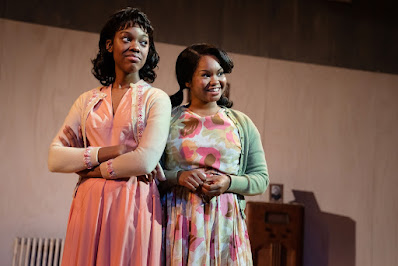What: Jamie Lloyd directs Amy Herzog's new adaptation of Ibsen's play, starring Jessica Chastain, about a woman, petted and coddled her whole life, who must realize the power and the cost of her own autonomy.
And? First preview! Woop woop! A few line flubs, a show pause while they fixed the turntable, but otherwise a smooth first preview. And my playbill has a sticker on it, so I feel extry special. Jamie Lloyd's production is predictably "dressed down": the actors in neutral black clothing, sitting in chairs, speaking quietly the dialogue of the play with little to no physicalizing of the actions of the script (besides a twitching fit for Nora's rehearsal of the tarantella). What this means is that the meat of the effectiveness of the storytelling lies in the actors' facility with their voices (I suppose there is also something happening in the cast's face acting, but the Hudson is a huge theater and from the Dress Circle I could see they had faces and that was about it). But Dionysus bless us, this cast is up for the challenge. The excellent cast of six gifts us diversity not only in ethnicity and physical abilities (Michael Patrick Thornton, who plays Dr. Rank, is an actor with a disability), but also in vocal timbre. If this were a radio play you would never have any question of who was speaking. Also, A+ to the sound design team of Ben & Max Ringham for the crystal clarity of each syllable uttered by the cast. Even with the cast speaking quietly in that barn of a theater, there is a very intimate quality to the evening.
Of course, as my show buddy Katie pointed out, this intimacy has its pluses and minuses. While the line of tension leading up to Torvald finally reading Krogstad's letter is finely tuned (and actualized by a tightening of the space with Jon Clark's lighting design), we miss some of the peaks and valleys in emotional intensity, some of the actual high-energy climaxing in the play itself. On the plus, I remarked to Katie during the mid-show pause that I was desperately craving a transformation of the space, and the audience was, too, whether they had the language for it or not. I am happy to report that this transformation did occur, and the audience lost their damn minds. I love live theater, y'all.
Final verdict: I don't know if this is the production to see if it's your first exposure to the play (but hey, maybe I'm wrong), but for myself, who's a bit wary of Ibsen at this point due to overexposure, I found this a refreshing and emotional take, even if the denouement felt a bit too long.
What: Skirball hosts an encore presentation of The Classical Theatre of Harlem's celebrated production of Shakespeare's play about love, grief, twins, and a trick.
And? My initial thought was that this was a bit too cartoonish a take on the play for me, but you know what, they won me over by the end. This cast is having a great time, Christina Sajous is giving her best Vanessa Williams as Olivia, Kara Young is an adorably panicked Viola, Israel Erron Ford is a charismatic Feste, and Allen Gilmore is a damn delight as Malvolio (a flyer in the program tells me that Classic Theatre of Harlem is producing a sequel called Malvolio, starring Gilmore in the title role, and this production definitely just convinced me to get myself a ticket to see it in July). I'll say, though, the one character this production doesn't think is much fun is poor Orsino. William DeMeritt does a lovely job but they don't let him clown around like they let everyone else. Oh and omg the costume design by Mika Eubanks is absolutely gorgeous, I loved it. A really fun take on the play.
 |
Kara Young and Christina Sajous as Viola and Olivia. Photo by
Richard Termine. |



%20Doomsday%20Scrolling%206.jpg)


